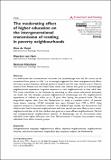The moderating effect of higher education on the intergenerational transmission of residing in poverty neighbourhoods
Abstract
It is well-known that socioeconomic outcomes and (dis)advantage over the life course can be transmitted from parent to child. It is increasingly suggested that these intergenerational effects also have a spatial dimension, although empirical research into this topic remains scarce. Previous research from Sweden and the United States shows that children who grow up in disadvantaged neighbourhoods experience long-term exposure to such neighbourhoods in their adult lives. This study contributes to the literature by examining to what extent educational attainment can break the link between parental neighbourhood disadvantage and the neighbourhood experiences of children as adults up to 12 years after leaving the parental home. We use longitudinal register data from the Netherlands to study a complete cohort of parental home leavers, covering 119,167 individuals who were followed from 1999 to 2012. Using sequence analyses as a visualisation method, and multilevel logit models, we demonstrate that children who lived in deprived neighbourhoods with their parents are more likely to live in similar neighbourhoods later in life than children who grew up in more affluent neighbourhoods. We find that intergenerational neighbourhood patterns of disadvantage can be discontinued when individuals attain higher education over time. Discontinuation is however less prevalent among individuals from ethnic minority groups.
Citation
de Vuijst , E , van Ham , M & Kleinhans , R 2017 , ' The moderating effect of higher education on the intergenerational transmission of residing in poverty neighbourhoods ' , Environment and Planning A , vol. 49 , no. 9 , pp. 2135-2154 . https://doi.org/10.1177/0308518X17715638
Publication
Environment and Planning A
Status
Peer reviewed
ISSN
0308-518XType
Journal article
Description
The research leading to these results has received funding from the European Research Council under the European Union’s Seventh Framework Programme (FP/2007–2013)/ERC Grant Agreement n. 615159 (ERC Consolidator Grant DEPRIVEDHOODS, Socio-spatial inequality, deprived neighbourhoods, and neighbourhood effects) and from the Marie Curie programme under the European Union’s Seventh Framework Programme (FP/2007–2013)/Career Integration Grant n. PCIG10-GA-2011-303728 (CIG Grant NBHCHOICE, Neighbourhood choice, neighbourhood sorting, and neighbourhood effects).Collections
Items in the St Andrews Research Repository are protected by copyright, with all rights reserved, unless otherwise indicated.

